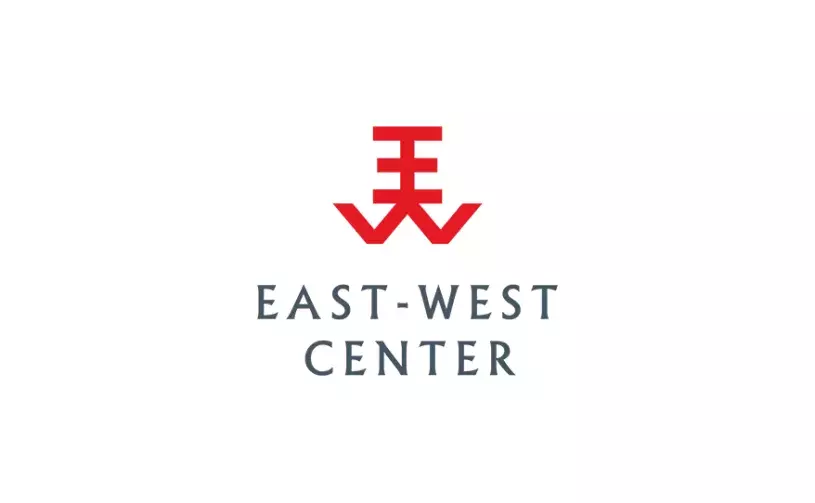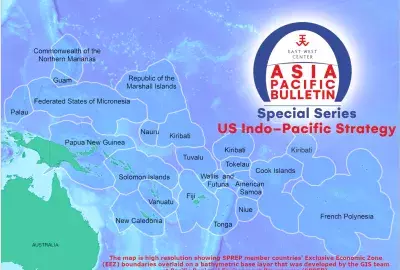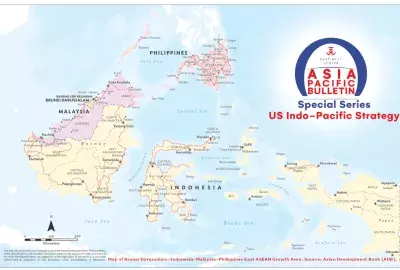Error message

|
Dr. Ngeow Chow-Bing, Deputy Vice Chancellor of Research and Innovation at the Institute of China Studies, University of Malaya, explains that “In general, Malaysia welcomes the NSP. Since 2016, there has been an acceleration of economic exchanges, intensification of people-to-people ties, and increased sub-national level interactions.“ |
Taiwan President Tsai Ing-wen has made the New Southbound Policy (NSP) a main anchor of Taiwan’s foreign policy. The NSP is not entirely “new”: Both Presidents Lee Teng-hui and Chen Shui-bian pursued similar policies aimed at strengthening Taiwan’s economic exchanges with the region and improving its political and diplomatic positioning. In comparison, Tsai’s NSP, while continuing emphasis on economic exchanges, is notable for its greater focus on people-to-people exchanges, and at the same time its political or symbolic dimensions are more subtle or even deliberately downplayed.
In general, Malaysia welcomes the NSP. Since 2016, there has been an acceleration of economic exchanges, intensification of people-to-people ties, and increased sub-national level interactions. Malaysia and Taiwan have always enjoyed robust bilateral trade, which increased 22.1% from 2017 to 2018 to reach $23.75 billion. By 2018, Taiwan was the sixth largest trading partner of Malaysia, while Malaysia was the seventh largest for Taiwan. In terms of investment, Taiwan is the fourth largest source of FDI to Malaysia (ahead of China). As of 2018 the total accumulated investment from Taiwan stood at $12.59 billion, with over 1,700 Taiwanese enterprises operating in Malaysia. In addition, Taiwan has leveraged a number of official, semi-official and business community platforms to further drive Taiwan-Malaysian economic relations. At the official level, in 2016 the Ministry of International Trade and Industry (MITI) of Malaysia and the Ministry of Economy of Taiwan set up a Malaysia-Taiwan Economic Cooperation Committee (MTECC) as the inter-governmental body to promote mutual trade, investment, and small and medium enterprises (SMEs) development. Two other key semi-official agencies advancing Malaysia-Taiwan economic exchanges are Malaysia External Trade Promotion Corporation and Malaysian Investment Development Authority (MIDA).
Beyond these official and semi-official channels, in Malaysia there are a number of organizations which have been playing the role of facilitating stronger economic ties between Taiwan and Malaysia, and which Taiwan can tap into and mobilize for promoting the NSP. While Taiwan Investors’ Association in Malaysia is formed by the Taiwanese entrepreneurs, both Malaysia-Taiwan Economic and Trade Association and the Federation of Alumni Association of Taiwan Universities Malaysia (widely known in Malaysia as Liutai Lianzong 留台聯總) were formed by Malaysians (the vast majority of them are of Chinese decent) who are keen to foster stronger ties with Taiwan. Liutai lianzong, in particular, is an influential organization with more than forty years of history, and among its members includes business elites, well-established professionals, and politicians across the political divide.
The NSP’s focus on connecting people is also reflected in Malaysia-Taiwan relations. Flights between Malaysia and Taiwan increased from 68 per week in 2015 to 130 per week in 2017, and Malaysia now ranks as ASEAN’s top source of tourists to Taiwan. Malaysia also has always been the largest ASEAN source of foreign students in Taiwan. In 2018 there were 16,717 Malaysian students pursuing tertiary education in Taiwan, more than twice as many as were studying in mainland Chinese universities. Under the NSP, Taiwan’s Education Ministry has also increased the quota of full government-sponsored scholarships to Malaysian students. The quota of Taiwan Fellowship, an academic exchange program for social science and humanities research, for Malaysian academics also increased. Mutual visits of think tanks and academic institutions have become more frequent, with the aim of soliciting input to enhance the implementation of the NSP.
Taiwan’s excellence in the health, science, and technology sectors is also another anchor. Kaohsiung Medical University, for instance, signed agreements with two major corporations in Malaysia in early 2019, involving the sharing of Taiwanese expertise and experience in healthcare and wellness service, teaching and research, talent cultivation and talent exchanges. In the agriculture/agro-based industry sector, there has always been strong interest from Malaysia to learn from Taiwan’s advances in agricultural technology. In 2019, the Agriculture Technology Research Institute of Taiwan signed an agreement with a Malaysian company in which the latter would set up a farm modelled after Taiwan’s farms and utilize Taiwanese technology and management.
Finally, while government-to-government interaction at the central level is handicapped, at the subnational/local government level, vigorous interactions have continued between Taiwan and Malaysia. A number of heavyweight politicians of Taiwan visited Malaysia in their capacity as mayors, including Lai Ching-te (former mayor of Tainan, in 2017), Ko Wen-je (mayor of Taipei, in 2017), and Han Kuo-yu (mayor of Kaohsiung, in 2019). Taiwan’s Yunlin County has had strong cooperation with Malaysia’s primary industry and agro-based industry sectors since 2016. The state government of Selangor in Malaysia has also been engaging Taiwan, particularly in e-commerce, the Halal industry, and the pharmaceutical industry. The state government of Johor also has a consistently strong interest in engaging Taiwan, particularly in learning from Taiwan’s experiences in developing agro-based industry and preserving cultural heritage to promote tourism.
It is clear that the NSP is trying to build a more diverse, comprehensive framework to increase Taiwan-Malaysia relations. Additionally, Taiwan uses “soft power” in politically non-controversial aspects of the relationship, such as education, culture, technology, health, etc. rather than promoting aspects that may resonate more in western countries such as democracy, human rights, and self-determination. There is also almost a purposeful avoidance of direct comparisons between the NSP and China’s Belt and Road Initiative (BRI). In this sense, Taiwan understands the sensitivity of the ‘China factor’ in advancing the NSP agenda in Southeast Asian countries, including Malaysia. Without this understanding, Malaysia may have been more cautious in welcoming the NSP.
Despite the achievements made so far, there is a clear boundary for how far the relations can proceed, especially regarding official and central governmental relations. Attempts by Taiwan to upgrade the bilateral economic agreements signed in the 1990s have been rebuffed by Malaysian officials out of concern that this would provoke China. The change of government in Malaysia in May 2018 has had no discernable impact on Malaysia’s policy toward Taiwan. There was initial optimism that the new and more democratic government would distance Malaysia from China, and hence present opportunities for Taiwan. The actual case was exactly the opposite, however. At the societal level, much of Taiwan’s engagement with Malaysia is mediated through the Malaysian Chinese community, whether in terms of student exchanges, cultural exchanges, investment and trade, or science and technology cooperation. This is a double-edged sword, in the sense that without this community, Taiwan would not have made many advances in engaging with Malaysia, yet at the same time, relations between Taiwan and the non-Chinese Malaysians still remain superficial and low-level. Also, the Malaysian Chinese community as a whole, while being friendly towards Taiwan, is more ‘blue’ than ‘green’ (to use the labels of the political spectrum in Taiwan); there is very little sympathy for Taiwan’s independence within this community.
|
Dr. Ngeow Chow-Bing, Deputy Vice Chancellor of Research and Innovation at the Institute of China Studies, University of Malaya, explains that “In general, Malaysia welcomes the NSP. Since 2016, there has been an acceleration of economic exchanges, intensification of people-to-people ties, and increased sub-national level interactions.“ |
Taiwan President Tsai Ing-wen has made the New Southbound Policy (NSP) a main anchor of Taiwan’s foreign policy. The NSP is not entirely “new”: Both Presidents Lee Teng-hui and Chen Shui-bian pursued similar policies aimed at strengthening Taiwan’s economic exchanges with the region and improving its political and diplomatic positioning. In comparison, Tsai’s NSP, while continuing emphasis on economic exchanges, is notable for its greater focus on people-to-people exchanges, and at the same time its political or symbolic dimensions are more subtle or even deliberately downplayed.
In general, Malaysia welcomes the NSP. Since 2016, there has been an acceleration of economic exchanges, intensification of people-to-people ties, and increased sub-national level interactions. Malaysia and Taiwan have always enjoyed robust bilateral trade, which increased 22.1% from 2017 to 2018 to reach $23.75 billion. By 2018, Taiwan was the sixth largest trading partner of Malaysia, while Malaysia was the seventh largest for Taiwan. In terms of investment, Taiwan is the fourth largest source of FDI to Malaysia (ahead of China). As of 2018 the total accumulated investment from Taiwan stood at $12.59 billion, with over 1,700 Taiwanese enterprises operating in Malaysia. In addition, Taiwan has leveraged a number of official, semi-official and business community platforms to further drive Taiwan-Malaysian economic relations. At the official level, in 2016 the Ministry of International Trade and Industry (MITI) of Malaysia and the Ministry of Economy of Taiwan set up a Malaysia-Taiwan Economic Cooperation Committee (MTECC) as the inter-governmental body to promote mutual trade, investment, and small and medium enterprises (SMEs) development. Two other key semi-official agencies advancing Malaysia-Taiwan economic exchanges are Malaysia External Trade Promotion Corporation and Malaysian Investment Development Authority (MIDA).
Beyond these official and semi-official channels, in Malaysia there are a number of organizations which have been playing the role of facilitating stronger economic ties between Taiwan and Malaysia, and which Taiwan can tap into and mobilize for promoting the NSP. While Taiwan Investors’ Association in Malaysia is formed by the Taiwanese entrepreneurs, both Malaysia-Taiwan Economic and Trade Association and the Federation of Alumni Association of Taiwan Universities Malaysia (widely known in Malaysia as Liutai Lianzong 留台聯總) were formed by Malaysians (the vast majority of them are of Chinese decent) who are keen to foster stronger ties with Taiwan. Liutai lianzong, in particular, is an influential organization with more than forty years of history, and among its members includes business elites, well-established professionals, and politicians across the political divide.
The NSP’s focus on connecting people is also reflected in Malaysia-Taiwan relations. Flights between Malaysia and Taiwan increased from 68 per week in 2015 to 130 per week in 2017, and Malaysia now ranks as ASEAN’s top source of tourists to Taiwan. Malaysia also has always been the largest ASEAN source of foreign students in Taiwan. In 2018 there were 16,717 Malaysian students pursuing tertiary education in Taiwan, more than twice as many as were studying in mainland Chinese universities. Under the NSP, Taiwan’s Education Ministry has also increased the quota of full government-sponsored scholarships to Malaysian students. The quota of Taiwan Fellowship, an academic exchange program for social science and humanities research, for Malaysian academics also increased. Mutual visits of think tanks and academic institutions have become more frequent, with the aim of soliciting input to enhance the implementation of the NSP.
Taiwan’s excellence in the health, science, and technology sectors is also another anchor. Kaohsiung Medical University, for instance, signed agreements with two major corporations in Malaysia in early 2019, involving the sharing of Taiwanese expertise and experience in healthcare and wellness service, teaching and research, talent cultivation and talent exchanges. In the agriculture/agro-based industry sector, there has always been strong interest from Malaysia to learn from Taiwan’s advances in agricultural technology. In 2019, the Agriculture Technology Research Institute of Taiwan signed an agreement with a Malaysian company in which the latter would set up a farm modelled after Taiwan’s farms and utilize Taiwanese technology and management.
Finally, while government-to-government interaction at the central level is handicapped, at the subnational/local government level, vigorous interactions have continued between Taiwan and Malaysia. A number of heavyweight politicians of Taiwan visited Malaysia in their capacity as mayors, including Lai Ching-te (former mayor of Tainan, in 2017), Ko Wen-je (mayor of Taipei, in 2017), and Han Kuo-yu (mayor of Kaohsiung, in 2019). Taiwan’s Yunlin County has had strong cooperation with Malaysia’s primary industry and agro-based industry sectors since 2016. The state government of Selangor in Malaysia has also been engaging Taiwan, particularly in e-commerce, the Halal industry, and the pharmaceutical industry. The state government of Johor also has a consistently strong interest in engaging Taiwan, particularly in learning from Taiwan’s experiences in developing agro-based industry and preserving cultural heritage to promote tourism.
It is clear that the NSP is trying to build a more diverse, comprehensive framework to increase Taiwan-Malaysia relations. Additionally, Taiwan uses “soft power” in politically non-controversial aspects of the relationship, such as education, culture, technology, health, etc. rather than promoting aspects that may resonate more in western countries such as democracy, human rights, and self-determination. There is also almost a purposeful avoidance of direct comparisons between the NSP and China’s Belt and Road Initiative (BRI). In this sense, Taiwan understands the sensitivity of the ‘China factor’ in advancing the NSP agenda in Southeast Asian countries, including Malaysia. Without this understanding, Malaysia may have been more cautious in welcoming the NSP.
Despite the achievements made so far, there is a clear boundary for how far the relations can proceed, especially regarding official and central governmental relations. Attempts by Taiwan to upgrade the bilateral economic agreements signed in the 1990s have been rebuffed by Malaysian officials out of concern that this would provoke China. The change of government in Malaysia in May 2018 has had no discernable impact on Malaysia’s policy toward Taiwan. There was initial optimism that the new and more democratic government would distance Malaysia from China, and hence present opportunities for Taiwan. The actual case was exactly the opposite, however. At the societal level, much of Taiwan’s engagement with Malaysia is mediated through the Malaysian Chinese community, whether in terms of student exchanges, cultural exchanges, investment and trade, or science and technology cooperation. This is a double-edged sword, in the sense that without this community, Taiwan would not have made many advances in engaging with Malaysia, yet at the same time, relations between Taiwan and the non-Chinese Malaysians still remain superficial and low-level. Also, the Malaysian Chinese community as a whole, while being friendly towards Taiwan, is more ‘blue’ than ‘green’ (to use the labels of the political spectrum in Taiwan); there is very little sympathy for Taiwan’s independence within this community.







